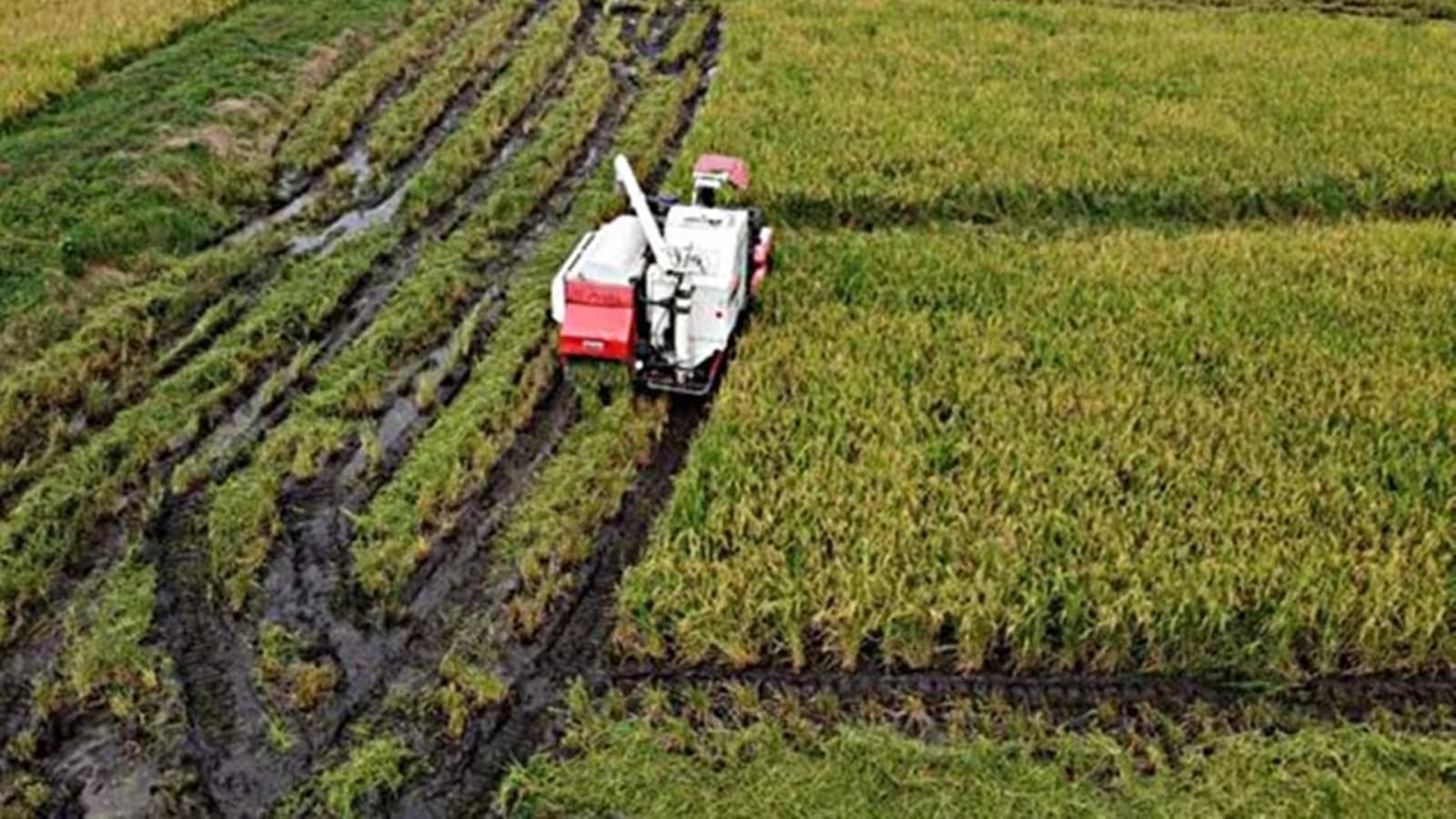Punjab Agriculture Policy 2023: Bold proposals for agrarian crisis, but implementation and funding remain uncertain
The Punjab Agriculture Policy 2023 recommendations include promoting crop diversification, providing a legal guarantee for the Minimum Support Price (MSP), offering one-time debt settlements for farmers, and introducing a pension plan for small farmers and farm workers.
 To promote crop diversification, comparative return patterns should be considered when setting prices for non-MSP crops.
To promote crop diversification, comparative return patterns should be considered when setting prices for non-MSP crops.The Punjab Agriculture Policy 2023 has effectively highlighted the state’s long-standing agrarian problems. The state has not had an agriculture policy to date. The policy proposes several measures to address the crisis, but funding remains a major concern.
These recommendations include promoting crop diversification, providing a legal guarantee for the Minimum Support Price (MSP), offering one-time debt settlements for farmers, introducing a pension plan for small farmers and farm workers, implementing special debt waivers for small and marginal farmers, registering money lenders, and instituting crop insurance, among others.
Implementation challenges and past failures
However, the key question remains: how will these recommendations be implemented, especially when past proposals from various committees, including renowned agricultural scientist Dr MS Swaminathan’s MSP recommendations and economist Sardara Singh Johl’s “Johl Plan” for diversification and crop rotation, have failed to materialise despite numerous farmer protests? While the policy outlines a roadmap for some suggestions, it remains unclear how the necessary funds will be sourced.
Farmer suicide data and non-institutional debt
The policy records farmer suicide data only up to 2018, and that too from a study by Punjab Agriculture University (PAU), Ludhiana, leaving out the past six years as well as the government’s own data on farmers’ suicide. It also remains silent on the issue of non-institutional debt, even though it mentions that farmers in Punjab are burdened with Rs. 73,673 crore in institutional debt. Many farmers have also taken loans from non-institutional sources such as finance companies, money lenders, and Arhtiyas. Until some years ago, farmers’ debt used to be quoted at over Rs one lakh crore, which has increased manifold.
Crop diversification and MSP guarantee
The 200-page policy, formulated by the Agriculture Formulation Committee led by Dr Sukhpal Singh, chairman of the Punjab State Farmers’ and Farm Workers’ Commission, and 10 other committee members, proposes establishing a legal guarantee for the procurement of MSP crops cultivated within the state.
It says a State Agricultural Costs and Prices Commission should be set up to provide cost and return estimates for all non-MSP crops, dairy products, and eggs to ensure fair prices for farmers. These estimates can also guide compensation, credit limits, and other issues. A legal guarantee of procurement at MSP is essential for the betterment of the farm sector.
To promote crop diversification, comparative return patterns should be considered when setting prices for non-MSP crops. This will encourage farmers to shift from wheat-paddy cycles to alternative crops. The Punjab government should engage in dialogue with the Union government to secure a legal guarantee of MSP procurement for crops grown in the state. At a minimum, MSP should be fixed according to the National Commission on Farmers (C2 + 50 per cent) recommendations (GOI, 2006, Swaminathan Report), with additional costs outlined in the Ramesh Chand Committee Report (GOI, 2015). For instance, during 2020-21, the MSP for wheat should have been 45 per cent higher (Rs 2787/q) than the Rs 1925/q set by the Government of India.
Debt settlement, pensions, and waivers
A “One-time Debt Settlement Scheme” has been recommended to be initiated through the Punjab State Cooperative Agricultural Development Bank (PADB) and other cooperative banks to provide relief to farmers. For pension coverage, the policy suggests that farm workers and small farmers (with up to 5 acres of land) receive pension benefits upon reaching the age of 60.
Additionally, a special debt waiver scheme should be crafted for small and marginal farmers, along with a Debt Swapping Scheme to assist borrowers with debt settlement. A separate one-time debt settlement scheme should be devised specifically for farm workers.
The registration of money lenders should be enforced to improve the functioning of the non-institutional credit system.
Crop insurance and land leasing
The policy suggests designing Punjab’s own crop insurance scheme by creating a crop insurance fund to mitigate crop losses. One-third of Panchayati land and other common lands should be leased to farm workers, designated for the Integrated Farming System (IFS) under cooperative farming. A similar livestock insurance scheme should be initiated through Milkfed and the Dairy Development Department.
Expansion of MGNREGA and suicide compensation
The policy proposes increasing the mandatory 100 days of work under the MGNREGA scheme to 200 days by taking up the matter with Centre. It also suggests providing Rs. 10 lakh in compensation to the families of farmers, farm workers, and rural artisans who have died by suicide. Free healthcare should also be extended to these groups.
Natural growing areas, diversification and water management
The policy emphasises growing crops in their natural growing areas (NGA) to improve crop quality and reduce production costs. It proposes banning paddy cultivation in 15 dark blocks, where water extraction exceeds the recharge rate by 300 per cent, and promoting alternative crops like cotton, maise, sugarcane, and vegetables in a phased manner.
Water-saving technologies, such as alternate wetting and drying, are recommended to improve paddy yield while using 30-40 per cent less water. But nothing new in it as PAU and Punjab Agriculture Department have already divided the state into six climate zones and recommended crops suitable for the climate of each zone, and several paddy growing techniques, including DSR, are there in place for less use of water for growing paddy.
Additionally, the policy focuses on micro-irrigation methods for several crops and advocates for already going on “Pani Bachao, Paisa Kamao” (PBPK) scheme.
Sugarcane, maise, cotton, crop-specific support and organic farming
The policy advocates immediate payment to sugarcane farmers by the sugar mills, strengthening cooperative sugar mills, and promoting ethanol production and Bio-CNG co-generation. For cotton, it calls for government intervention and support from the Cotton Corporation of India, while suggesting micro-irrigation methods and incentives for cotton-wheat rotation in designated zones.
It proposes providing maise dryers to farmers and suggests replacing paddy with basmati in certain areas. Markfed should intervene with a price stabilisation fund in cases of price distress for basmati and recommended banning long-duration paddy varieties. Farmers have long raised all these demands. The committee also stressed the importance of organic farming.
Centres of excellence, progressive farmers’ societies, developing Punjab as a seed hub and strengthening research
The policy proposes establishing 13 Centres of Excellence (CoE) for different crops and alternatives within their Natural Growing Areas (NGA) to serve as hubs of knowledge. These institutes would demonstrate the latest technologies and provide training for farmers and other stakeholders. Currently, Punjab has CoEs for vegetables, citrus, and other crops.
Additionally, the policy discusses the formation of Progressive Farmers’ Societies (PFS), which would be linked to the respective crop CoEs. It also calls for the creation of an Agricultural Marketing Research and Intelligence Institute (AMRII) to balance demand and supply, and an Innovative Agricultural Marketing Society (IAMS), which would act as the apex marketing body for 18 crop-specific Progressive Farmers’ Societies.
This organisation would market diverse, high-quality produce with advanced planning, keeping in view the demand-supply scenario. The policy emphasises that Punjab should be developed as a Seed Hub, with different crop seeds being cultivated in various districts according to climate and crop suitability. For example, potato seeds are being grown in the Doaba region.
It also highlights the need to ensure a timely canal water supply in the cotton belt, discourage paddy cultivation, and incentivise cotton in the designated cotton zones of the southwestern districts. Additionally, it advocates for promoting micro-irrigation for the cotton-wheat rotation, in conjunction with solar pumps and water storage structures on individual farms.
For horticultural crops like fruits, it recommends improving nurseries to provide high-quality planting material to farmers and upgrading kinnow value addition infrastructure, such as maintaining cold chains within the state and for transportation.
Machinery hub and agricultural extension
The policy proposes building Punjab as a hub for innovative farm machinery manufacturers, catering to domestic and international markets. It also emphasises strengthening agricultural research and extension services by filling vacant posts (long pending demands in Punjab) and updating land tenancy laws.
Free power to farming sector
The policy has discussed the huge burden of free power subsidy, which is around Rs 8,000-9,000 crore annually, on the farming sector’s state exchequer, and it should be reduced through different farming techniques, such as using less water to grow the crops. But experts said the policy could not elaborate the immediate measures like considering only small, marginal, and low-medium farmers under this scheme and charging some fixed minimum amount from the big farmers of the state to reduce this burden to some extent.
Farmer concerns and lack of implementation roadmap
Jagmohan Singh, general secretary of Bhartiya Kisan Union (Dakuanda), welcomed the pro-farmer recommendations but expressed concerns over the lack of an implementation roadmap.
“If the government provides some assurance on how these recommendations will be achieved, where the funds will come from, how farmers’ debts will be settled through a one-time scheme, what the pension amount for farmers will be, and how compensation for crops sold at low prices will be ensured, only then can we call it a satisfactory policy; otherwise, it remains just a document,” he said.







